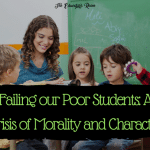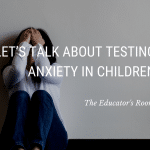Age-grading is, in a word, stupid. It is built on a cultural conception of development that precludes the ability of individuals of different ages to have healthy, appropriate interactions and learn from one another. Unless, of course, a clear power dynamic defines the relationship: teacher-student, babysitter-child, employer-worker, coach-player etc., then the interaction is sanctioned.
Instead of conceptualizing learning as a continuous journey towards mastery, we chop it into grades. Instead of ensuring on-going growth, we worry about grade retention and grade skipping. Instead of acknowledging that learning is a messy, individual process, we create a set of artificial goal posts on an even more artificial timeline.
[bctt tweet=”Instead of acknowledging that learning is a messy, individual process, we create a set of artificial goal posts on an even more artificial timeline.” username=””]
The fundamental mindset, the mental model, of school as a series of age-based experiences, is deeply ingrained in our consciousness. Even when we, as teachers, see an obvious need for students to advance at different paces, our solutions are entirely rooted in our existing age-graded system.
Are we really so blind? So unwilling to genuinely examine our institutional structures? So blind to our assumptions? At what point will we embrace this truth: Everyone misses out in an age-graded system.
This is especially pernicious for pre-adolescents and teenagers. Teens are vilified constantly. Not only are they restricted from interactions with different age groups, they are further stridently forbidden to listen to their peers. Age-grading is a recipe for isolation. The societal ills that burgeon under this system are numerous. But I digress.
The whole concept of basing school on age is problematic. We either believe a child must be a certain age in a certain grade to learn certain things OR we believe a child should progress based on his/her development and mastery. Age-grading and standards are diametrically opposed and fundamentally irreconcilable.
Trying to impose standards on an age-graded system is a travesty. The negative impacts are numerous. First, teachers are forced to prioritized external goals over individual student needs. Then students are left feeling inadequate when their progress fails to match that of their peers. Finally, meeting of an external standard supersedes growth: those who may have grown the most are punished and those who are pushed very little reap the greatest rewards.
Were we to seriously redesign educational institutions around learning, age would cease to be a determining factor. This is why the standards movement has been, in so many ways, such a monumental failure. Whether we are talking about grade-skipping, personalized learning, or independent study, age-grading continuously restricts creative educational thinking.
But. When I talk to people about this; when I talk to teachers, parents, random adults, even students, they all get it. No one tries to argue the reality of our age-graded system or its incompatibility with mastery. Yet I’ve rarely had this conversation with someone who has thought about it before, who has overcome the mental model of age-grading, who considers it an obstacle that might be surmountable.
What are the alternatives? Maybe the Montessori model offers some reasonable ideas. Perhaps when we start thinking about reforming schools, we should start with this premise: student learning should drive student progression through stages of learning, whether they’re called grades, or levels, or schools, or units, or whatever else we might choose to call it.
Age-grading is deeply etched into our mental models of school. Until and unless we acknowledge and address this reality, we will continue to flounder around wondering why standards aren’t a magic panacea for all our educational ills.






